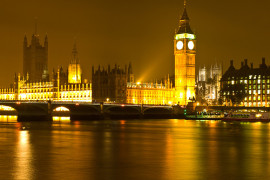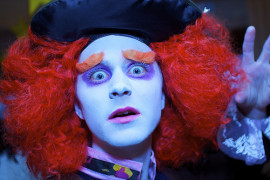This is a guest post from Craig Byers of Is the BBC Biased?
One of the big BBC-related stories of the past week has been the appearance of Lord Hall, James Harding and David Jordan at parliament’s European Scrutiny Committee discussing the BBC’s policies in the light of the upcoming EU referendum.
Two parts of the discussion have dominated the media’s reporting of it:
The first was that “all BBC journalists” will be sent for “mandatory training” so that they become “as well-informed as possible of the issues around the workings of the institutions of the EU and its relationship to the UK”.
(So that’s John Humphrys, James Naughtie, Evan Davis, Kirsty Wark, Katya Adler, Jeremy Bowen, etc?)
The second concerned the meeting’s most heated moment – when Jacob Rees-Mogg confronted David Jordan (director of editorial policy and standards) over EU funding for the BBC – the reporting about which has been somewhat confusing (to my mind).
Mr Jordan began by replying that the BBC “doesn’t take money from the EU” and that the organisation that does take money from the EU (£35 million), Media Action, is “owned by the BBC” but “independent”.
On being pushed further (over a FoI request by The Spectator into EU funding for the BBC), however, things got murkier and Mr Jordan and Mr Rees-Mogg began to fall out:
David Jordan: There are two things you were referring to – the question that you asked last time, which was in relation to Media Action, so I answered…
Jacob Rees-Mogg: Well, I wasn’t actually. Last time I was asking about EU funds broadly, not Media Action.
David Jordan: Well, it’s that £35 million figure which you quoted which relates to the Media Action…
Jacob Rees-Mogg: But you replied about Media Action when I was asking about all EU funding….
Having watched their earlier exchange again, Mr Rees-Mogg is correct. He didn’t ask about Media Action or “quote” that £35 million figure earlier. Here’s how their discussion started:
Jacob Rees-Mogg: I just want to go back to a question we came to the last time you came to the committee, on the money that the BBC receives from the EU, which I know isn’t huge in your overall budget but which is still some tens of millions. One of the standard contractual terms when the EU hands out money is that those receiving money won’t say or do anything damaging to the interests of the EU. Does the BBC agree to those standard contractual terms and will they take money from the EU between now and the referendum?
David Jordan: The BBC as a public service broadcaster doesn’t take money from the EU. The organisation to which you’re referring that take money from the EU is an organisation called Media Action and that’s an independent part of the BBC with independent trustees……..
The committee’s chairman, however, only added to the confusion here by wrongly ascribing that “quote” about the £35 million to Mr Rees-Mogg himself shortly after, so maybe Mr Jordan’s apparent confusion on that point is more understandable:
William Cash: Why do you need to receive the £30 million I think that Jacob referred to…?
The disagreements continued, however, and David Jordan, in answer to pushing on that Spectator FoI request, said that independent companies who make programmes for the BBC also receive some EU funding and that the EU also funds some other things, such as translating programmes made in English into other EU languages (as seemed to have been the case with the highly controversial pro-EU mockumentary The Great European Disaster Movie).
Jacob Rees-Mogg: Look, you are now giving me a really different answer from the one you gave before. I never mentioned Media Action. I only mentioned EU funding. You gave an answer about overseas aid and now you’re saying the BBC does receive money to help with some of its programming and does receive money to translate some of its programming and you are therefore signed up to the contractual agreements from the EU that require you not to damage its interests. Why didn’t you give the full answer the first time.
David Jordan: I gave a very full answer about Media Action and now I’m giving a very full answer about how other funds are occasionally available for other programmes to make use of…
Jacob Rees-Mogg:…which you denied in response to my first question.
William Cash then told them to calm down and moved the discussion on – which is unfortunate, I think, as many issues were still left dangling in the air over the EU money that isn’t spent on Media Action. Mr Rees-Mogg still seemed unclear about that. I’m certainly unclear about it.
And does the BBC sign up to that contractual agreement with the EU when it accepts the funding for innocuous-sounding tasks like translations and those other aspects of programming (whatever they may be exactly), apparently always involving independent companies?
And what if those independent companies only produce pro-EU programmes for the BBC (like The Great European Disaster Movie?) How would that free the BBC from charges of pro-EU bias? Does their independence’ and the apparent fact that the EU money they get goes on things like translations really get the BBC off the hook here?
Such questions need a lot more scrutiny.
Why the BBC doesn’t monitor itself for bias
One of the less-reported things about the European Scrutiny Committee’s encounter with the three top BBC bosses was that it discussed something close to our hearts: monitoring bias.
What I took away from it was that after the Wilson Report into the BBC’s (pro-) EU coverage, the BBC had pledged to put some form of monitoring into place but that, having tried doing so, has now abandoned monitoring again and won’t be re-introducing it in the run-up to the EU referendum.
Sir Bill Cash, repeatedly citing News-watch’s close monitoring of the BBC’s EU coverage, argued that the BBC ought to be carrying out such monitoring and making its finding publicly available for people to check. He wants a Hansard-style logging system, comparable to News-watch’s extensive archive of transcriptions, and, given its huge budget and sheer size, wanted to know why the BBC isn’t doing so?
The most concise statement of the BBC’s position came from David Jordan, the BBC’s head of editorial policy and standards:
I think we gave up the monitoring that the chairman is talking about at the time because we found it to be actually very unhelpful and not helpful at all in even deciding and defining whether we were impartial.
And I think in the context of other appearances and elections we’ve discovered the same thing. For example, if you’re covering an election how do you define somebody who’s on a particular party but it opposing something that party is doing at the time they were appearing on the radio? Are they, as it were, in that party’s column or are they in another column that tells you what they were doing? It becomes very, very confusing and doesn’t necessarily sum up the nuances and differences that exist in election campaigns in our experience.
So that was the reason I think why we gave it up.
It was also very, very expensive and time-consuming too.
And we thought that allowing editors to be essentially responsible for impartiality in their output and having an overall view which we get through a series of meetings and discussions which take place in the BBC, were a better way to ensure we achieved impartiality that through simple number-counting.
I have to say I laughed when he said that such monitoring had proved to be “actually very unhelpful and not helpful at all”. Cynically, I thought, “I bet it wasn’t – especially if it came up with the ‘wrong’ results” (a bit like the Balen report?)
I didn’t buy his example either. For me, it’s hardly rocket science to, say, note in one column that Kate Hoey is a Labour Party representative and in another column to note that she’s anti-EU. I can’t see why that would be “very, very confusing”.
Also, I don’t buy the it’s “very, very expensive and time-consuming too” argument either. If a small number of people at News-watch can monitor and transcribe every EU-related interview on major BBC programmes over many, many years then surely an organisation of the size and resources of the BBC can run something similar for its major news bulletins and flagship programmes too. It’s not that difficult. I work full-time and still managed to monitor every political interview on all the BBC’s main current affairs programmes for nine months (in 2009-10) – and at no expense whatsoever!
Also, if you simply rely on editorial judgement – on both the small and large scales (in individual programmes and at senior editorial meetings) – then many individual biases could result and multiply. In an organisation containing so many like-minded people as the BBC, those biases would doubtless head in the same direction and become self-reinforcing. Therefore, they probably won’t be spotted as biases at all – merely sensible, impartial BBC thinking. Who then would be able to point out that it isn’t being impartial after all?
Given that many people think that this kind of groupthink the problem and that, as a result, the BBC are blind to their own biases, asking us to trust the judgements of BBC editors en masse isn’t likely to reassure us….
….which is where what David Jordan derisively calls “number-crunching” comes in.
If over a year of, say, Newsnight there are 60 editions that deal with the UK-EU relationship in some way. Say 55 of those editions featured a pro-Stay guest but only 35 featured a pro-Leave guest, then number-crunching surely would surely raise a serious question about the programme’s impartiality?
If, say, 9 of those pro-Leave guests came from UKIP and the other 26 came from the Conservatives but no pro-Leave Labour or Green guests appeared then that would also surely indicate a serious bias?
Is it really beyond the ability of programme editors to count and record such figures – and to then make them publicly available?
If their figures show exceptional impartiality (45 pro-Stay, 45 pro-Leave guests), then they will surely win more people over, wouldn’t they?
What would they have to lose?
The full transcript of the committee meeting is available here.





